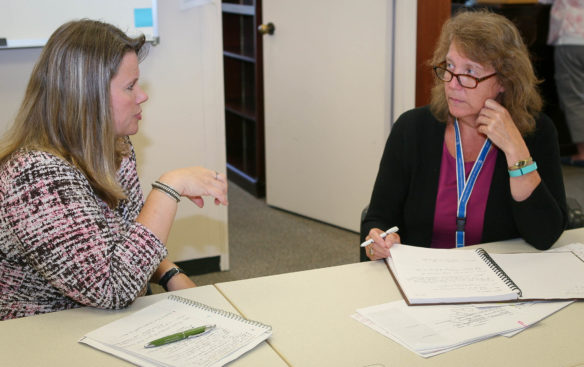
Cherry Boyles, left, Washington County’s director of instruction and Rae McEntyre, Kentucky Department of Education science consultant, work on a plan to train Washington County teachers on enhancing their use of formative assessment.
Photo by Brenna R. Kelly, Sept. 6, 2016
By Brenna R. Kelly
Brenna.kelly@education.ky.gov
A group of Washington County teachers is helping the Kentucky Department of Education improve science instruction and assessment across the state and nation.
This school year, 12 teachers will use formative assessment practices in science classes from kindergarten through 12th grade as part of a grant from the Council of Chief State School Officers (CCSSO) administered by KDE.
With formative assessment, teachers can see what students are learning as they are learning it, which allows them to modify their teaching technique if needed.
The grant is funding the implementation of new tools to improve teacher feedback to students and enhance teachers’ ability to adjust their instruction in response to student learning.
“Because formative assessment is more about classroom instruction and student engagement than testing, the work will be critical to improving student learning throughout the nation,” said Cherry Boyles, Washington County’s director of instruction.
The teachers will use a tool called the Formative Assessment Rubrics, Reflection and Observation Protocol (FARROP) to help them analyze both their own and their colleagues’ formative assessment practices.
They will also develop and implement performance tasks to allow students to demonstrate their understanding of science and engineering practices.
The teachers will measure the success of the work using the FARROP, surveys and academic indicators.
The grant is part of CCSSO’s Formative Assessment for Teachers and Students (FAST) State Collaborative on Assessment and Student Standards (SCASS) project, funded by the Hewlett Foundation. KDE Science Consultant Rae McEntyre applied for the $128,000 grant after learning about it at conference.
“I thought about what we are doing in science and saw that there was a connection to our new science assessments, which will include rich tasks in science,” McEntyre said.
The state’s proposed science assessment system has three parts – classroom-embedded assessments; through-course tests, which are assessments are given throughout the year; and state summative assessments, she said.
The new system, aligned to Kentucky’s Academic Standards for Science, will be field-tested in spring 2017 and implemented statewide in the spring 2018.
In addition to creating new science assessments, KDE also has been trying to get more districts across the state to use formative assessment practices, McEntyre said.
“So I thought, maybe we can combine the two – what we are trying to do with the science assessments and with formative assessment – and use this tool,” she said.
And when she wrote the grant, McEntyre already knew which school district would be perfect to help with the work.
“We specifically chose Washington County because of their innovative thinking and desire to push professional learning,” she said.
Boyles said the district has been using formative assessment practices, “but we still have quite a bit to learn.”
The FARROP tool will help teachers gauge whether they are improving in creating and using learning goals, in creating success criteria and in developing tasks that show whether a student has met the learning goals.
Teachers will partner with colleagues in the next highest grade level to work on the lessons, observe each other teaching them and then analyze the outcomes. Washington County principals also will use the observation tools in the FARROP to help teachers improve their instruction, Boyles said.
“The principals and the teacher leader team are hopeful of that the tool will give principals the opportunity to give more detailed feedback during observations so that they can continue to help teachers progress their formative assessment practice,” she said.
Though the FARROP includes 10 dimensions, Washington County teachers will focus on the first three – learning goals, criteria for success and tasks and activities that elicit evidence of student learning. Those dimensions will have an immediate impact on Kentucky’s science assessment system, McEntyre said.
Another benefit of the work will be a renewed focus on learning goals, she said. After the science standards were implemented, facilitators in the science leadership networks reported that many teachers struggled with identifying specific learning goals, McEntyre said.
“Many teachers were incorporating activities without a clear connection to the learning outcomes for their students,” she said.
The formative assessment work will help teachers align learning goals with science and engineering practices, then create performance tasks that show whether a student has met the goal, McEntyre said.
The teachers will decide which science and engineering practices to focus on and the resulting tasks will be used to develop in the new science assessment system, McEntyre said.
In order to spread the use for formative assessment across the state and nation, the Washington County teachers’ work will be available on PBS Learning Media. Kentucky Educational Television will record video of the teachers using the formative assessment practices in the classroom.
The teachers will also create learning guides to go along with the videos, including lesson plans, sample tasks and examples of student work.
“We think this will be really beneficial for teachers, because they always want to know, ‘What does it look like?’” Boyles said. “You can study and read and talk about formative assessment practices in the classroom, but it’s good to see how it changes the structure of the classroom, how to build time in, or how to be intentional to make it happen.”
McEntyre and Boyles expect the work to be completed by the end of the 2016-17 school year, with a final report to be issued in July.
MORE INFO …
Rae McEntyre Rae.McEntryre@education.ky.gov
Cherry Boyles Cherry.Boyles@washington.kyschools.us



Leave A Comment